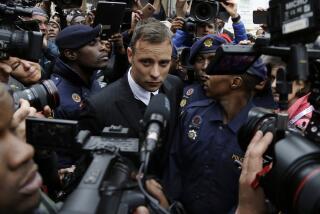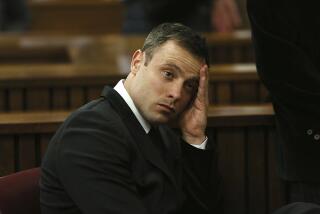S. Africa Eases Activistâs Bail Terms
JOHANNESBURG, South Africa â The Rev. Allan Boesak, one of South Africaâs leading anti-apartheid activists, was freed from tough bail restrictions Monday and permitted to address political rallies, talk to the press and travel around the country and abroad while awaiting trial on subversion charges.
Boesakâs appeal for less restrictive bail was approved by Magistrate Willem A. de Klerk, who found the 40-year-old Colored (mixed-race) theologian to be a âman of high political morals and idealsâ who would be unlikely to flee the country to avoid standing trial.
âJustice is alive, God be praised,â Boesak said after the hearing in Malmesbury, a small town about 35 miles north of Cape Town. âThe struggle goes on.â
De Klerkâs ruling was a major legal setback for the government, which had sought--in detaining Boesak in August and then releasing him under stringent conditions in September--to silence one of the strongest and most eloquent voices in the campaign against South Africaâs apartheid system.
Rebel Leader Interviewed
Meanwhile, in Cape Town, the Cape Times, now South Africaâs leading liberal newspaper, appeared to set up a legal confrontation by publishing a 3,600-word interview with Oliver Tambo, president of the illegal African National Congress. Anthony Heard, the paperâs chief editor, conducted the interview and described Tambo as âan essentially moderate black leader.â
Tambo was quoted in the interview as urging President Pieter W. Botha to create a climate for talks with his black nationalist organization.
âThere is always a possibility of a truce,â Tambo told Heard. âIt would very very, very easy if, for example, we started negotiations.â But such talks, he added, depend on the release of jailed rebel Nelson Mandela and on other conditions.
As a âbannedâ person, Tambo may not be quoted in South Africa. Such a lengthy interview, the first published here since the congress was outlawed in 1960 and Tambo and other leaders went into exile, could be construed by the government as promoting the groupâs aims.
Coming in the wake of discussions between congress leaders and the liberal white opposition Progressive Federal Party and leading white businessmen, the Cape Times interview is certain to anger the government. Heard expects to be charged with quoting a banned person, according to colleagues, in what he sees as an important test case for freedom of the press and the right of political expression.
In reducing Boesakâs bail, De Klerk said âthe court has come to the conclusion that he is a man of high political morals and ideals and that he believes these things very strongly. His principles require him to stand trial so he can put forward his point of view more strongly. It is not only improbable but most unlikely that (he) will abscond without standing trial.â
The magistrate, in an unusual display of independence by a South African civil servant, also declared the restrictions imposed on Boesak while he was free on $8,000 bail to be âtoo wide.â
Boycotts, Divestiture Calls
Under the new bail conditions, Boesak is still barred from âinstigating or propagatingâ student strikes, consumer boycotts and foreign divestiture, the basis of the charges against him, and he may not visit primary or high schools or communicate with state witnesses against him.
Boesak was arrested on the eve of a march of 25,000 people to the prison where Mandela, the jailed patriarch of the African National Congress, is serving a life sentence. His case was postponed until May, and he says he will visit the United States this month to accept the Robert F. Kennedy humanitarian award. He plans later visits to Sweden and Norway.
Meanwhile, national police headquarters in Pretoria reported Monday that a black officer was killed over the weekend while guarding the house of a black official in Soweto, the township outside Johannesburg. Police also said 43 blacks were arrested in the murder of a man who was hacked to death in Port Elizabeth last week in the belief that he was an informer.
The South African Institute of Race Relations, which monitors the continuing unrest closely, reported that 834 people, mostly blacks or Coloreds, have died in the last 14 months. Of these, 53% were killed by the police and army and 29% by other blacks; the circumstances of the other deaths were not clear.
Since the imposition of a partial state of emergency in July, the average number of deaths per day has declined by a third or more in eastern Cape province and in the black townships east of Johannesburg. But overall, it has more than doubled--from 1.66 deaths per day to 3.41, as racial strife has spread to other areas, according to the institute.
More to Read
Sign up for Essential California
The most important California stories and recommendations in your inbox every morning.
You may occasionally receive promotional content from the Los Angeles Times.










